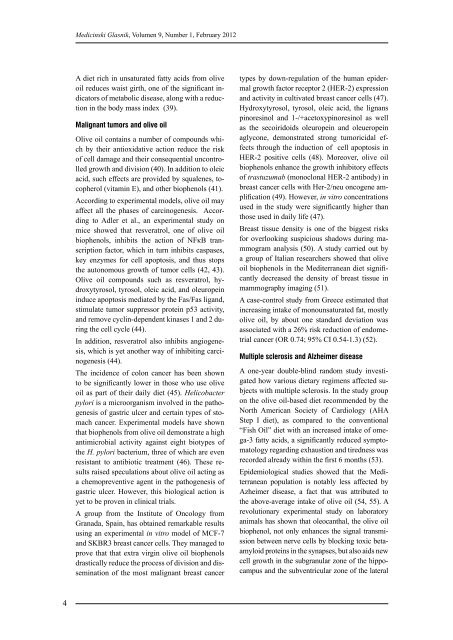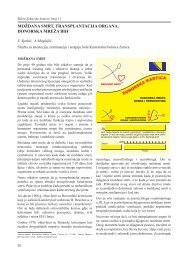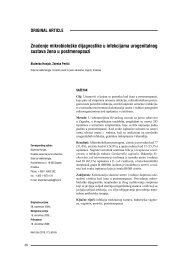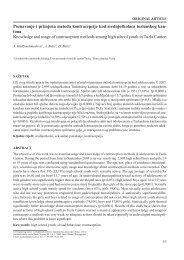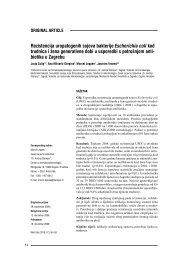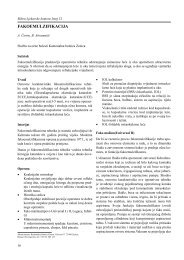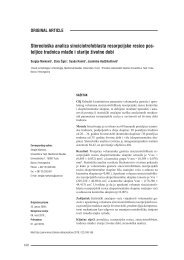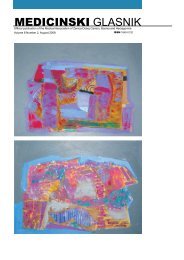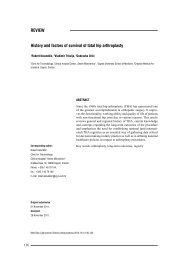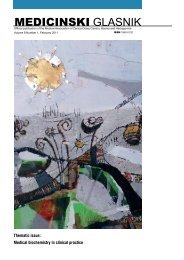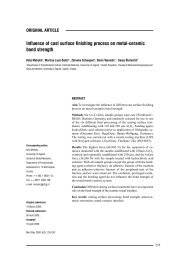MEDICINSKI GLASNIK
MEDICINSKI GLASNIK
MEDICINSKI GLASNIK
Create successful ePaper yourself
Turn your PDF publications into a flip-book with our unique Google optimized e-Paper software.
4<br />
Medicinski Glasnik, Volumen 9, Number 1, February 2012<br />
A diet rich in unsaturated fatty acids from olive<br />
oil reduces waist girth, one of the significant indicators<br />
of metabolic disease, along with a reduction<br />
in the body mass index (39).<br />
Malignant tumors and olive oil<br />
Olive oil contains a number of compounds which<br />
by their antioxidative action reduce the risk<br />
of cell damage and their consequential uncontrolled<br />
growth and division (40). In addition to oleic<br />
acid, such effects are provided by squalenes, tocopherol<br />
(vitamin E), and other biophenols (41).<br />
According to experimental models, olive oil may<br />
affect all the phases of carcinogenesis. According<br />
to Adler et al., an experimental study on<br />
mice showed that resveratrol, one of olive oil<br />
biophenols, inhibits the action of NFκB transcription<br />
factor, which in turn inhibits caspases,<br />
key enzymes for cell apoptosis, and thus stops<br />
the autonomous growth of tumor cells (42, 43).<br />
Olive oil compounds such as resveratrol, hydroxytyrosol,<br />
tyrosol, oleic acid, and oleuropein<br />
induce apoptosis mediated by the Fas/Fas ligand,<br />
stimulate tumor suppressor protein p53 activity,<br />
and remove cyclin-dependent kinases 1 and 2 during<br />
the cell cycle (44).<br />
In addition, resveratrol also inhibits angiogenesis,<br />
which is yet another way of inhibiting carcinogenesis<br />
(44).<br />
The incidence of colon cancer has been shown<br />
to be significantly lower in those who use olive<br />
oil as part of their daily diet (45). Helicobacter<br />
pylori is a microorganism involved in the pathogenesis<br />
of gastric ulcer and certain types of stomach<br />
cancer. Experimental models have shown<br />
that biophenols from olive oil demonstrate a high<br />
antimicrobial activity against eight biotypes of<br />
the H. pylori bacterium, three of which are even<br />
resistant to antibiotic treatment (46). These results<br />
raised speculations about olive oil acting as<br />
a chemopreventive agent in the pathogenesis of<br />
gastric ulcer. However, this biological action is<br />
yet to be proven in clinical trials.<br />
A group from the Institute of Oncology from<br />
Granada, Spain, has obtained remarkable results<br />
using an experimental in vitro model of MCF-7<br />
and SKBR3 breast cancer cells. They managed to<br />
prove that that extra virgin olive oil biophenols<br />
drastically reduce the process of division and dissemination<br />
of the most malignant breast cancer<br />
types by down-regulation of the human epidermal<br />
growth factor receptor 2 (HER-2) expression<br />
and activity in cultivated breast cancer cells (47).<br />
Hydroxytyrosol, tyrosol, oleic acid, the lignans<br />
pinoresinol and 1-/+acetoxypinoresinol as well<br />
as the secoiridoids oleuropein and oleueropein<br />
aglycone, demonstrated strong tumoricidal effects<br />
through the induction of cell apoptosis in<br />
HER-2 positive cells (48). Moreover, olive oil<br />
biophenols enhance the growth inhibitory effects<br />
of trastuzumab (monoclonal HER-2 antibody) in<br />
breast cancer cells with Her-2/neu oncogene amplification<br />
(49). However, in vitro concentrations<br />
used in the study were significantly higher than<br />
those used in daily life (47).<br />
Breast tissue density is one of the biggest risks<br />
for overlooking suspicious shadows during mammogram<br />
analysis (50). A study carried out by<br />
a group of Italian researchers showed that olive<br />
oil biophenols in the Mediterranean diet significantly<br />
decreased the density of breast tissue in<br />
mammography imaging (51).<br />
A case-control study from Greece estimated that<br />
increasing intake of monounsaturated fat, mostly<br />
olive oil, by about one standard deviation was<br />
associated with a 26% risk reduction of endometrial<br />
cancer (OR 0.74; 95% CI 0.54-1.3) (52).<br />
Multiple sclerosis and Alzheimer disease<br />
A one-year double-blind random study investigated<br />
how various dietary regimens affected subjects<br />
with multiple sclerosis. In the study group<br />
on the olive oil-based diet recommended by the<br />
North American Society of Cardiology (AHA<br />
Step I diet), as compared to the conventional<br />
“Fish Oil” diet with an increased intake of omega-3<br />
fatty acids, a significantly reduced symptomatology<br />
regarding exhaustion and tiredness was<br />
recorded already within the first 6 months (53).<br />
Epidemiological studies showed that the Mediterranean<br />
population is notably less affected by<br />
Azheimer disease, a fact that was attributed to<br />
the above-average intake of olive oil (54, 55). A<br />
revolutionary experimental study on laboratory<br />
animals has shown that oleocanthal, the olive oil<br />
biophenol, not only enhances the signal transmission<br />
between nerve cells by blocking toxic betaamyloid<br />
proteins in the synapses, but also aids new<br />
cell growth in the subgranular zone of the hippocampus<br />
and the subventricular zone of the lateral


